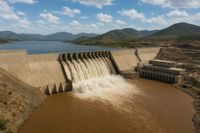
For centuries, the Nile has been a lifeline — a river that births civilizations, feeds nations, and fuels legends. But today, the Nile is also the stage of one of the boldest human projects on Earth: the Grand Ethiopian Renaissance Dam (GERD).
After years of construction, delays, and global debate, Ethiopia has announced that the dam has now reached full power generation capacity — 5,150 megawatts. This makes it the largest hydroelectric dam in Africa, and one of the most powerful anywhere in the world.
To put that in perspective: this single project could light up nearly half of Ethiopia’s 120 million citizens. Entire cities that once faced rolling blackouts could now hum with steady electricity. Factories could run without pause. Schools, hospitals, and households could experience stability that once felt like a dream.
This isn’t just an engineering triumph — it’s a continental awakening.
But with great power comes great tension. The Nile flow 11 countries, and no river is more politically charged.
Egypt calls the Nile its “lifeblood.” More than 95% of Egyptians live along it. Any reduction in flow could cripple its agriculture, food supply, and economy. Sudan lies directly downstream. The GERD could stabilize floods — but in times of drought, it could also choke water flow.g
That’s why, since Ethiopia broke ground on GERD, there have been whispers — and sometimes shouts — of “Water Wars.”
Egypt fears GERD could tighten Ethiopia’s grip on the Nile. Sudan fears instability. Ethiopia, meanwhile, insists it is claiming its right to development.
Third is more than a regional quarrel. It’s a story about how nations survive in an age of climate change and scarce resources.
GERD is not just a dam — it’s a trigger point for five global conversations happening right now:
Climate & Energy: Hydropower is renewable, clean, and massive. GERD positions Africa as a leader in the global renewable race. Food Security: If water flow shifts, millions downstream could face shortages. Food inflation and migration could follow. Geopolitics: Who owns the Nile? Treaties dating back to colonial times gave Egypt control. Ethiopia is rewriting the script. The Global South Rising: For once, Africa is not waiting for handouts. Ethiopia self-financed most of this project. It is a symbol of independence, pride, and ambition. Conflict or Cooperation?: Will this spark war? Or force a new era of water diplomacy? The answer will ripple far beyond Africa.
Behind the megawatts are human stories:
A farmer in northern Ethiopia who no longer worries if his crops will rot in storage — because electricity keeps cooling systems alive. A student in Addis Ababa who can study at night without a flickering candle. A Sudanese farmer who fears that one drought, one mismanaged release, could starve his land. An Egyptian parent who whispers: “If the river slows, how will we feed our children?”
These voices transform GERD from a “mega project” into a human drama.
GERD is here. It cannot be undone. The real question now is: What happens next?
If Ethiopia, Egypt, and Sudan cooperate, the Nile could become a shared lifeline of peace and prosperity. If mistrust grows, the Nile could spark one of the most dangerous conflicts of the 21st century.
The dam is both promise and peril, hope and hazard.
Risk?
For too long, Africa’s global stories have been told as tragedy, charity, or dependency. GERD flips that narrative. This is an African project of ambition — a statement to the world: “We build. We rise. We claim our future.”
But ambition without trust is fragile. GERD forces a new question: can Africa’s nations turn power into unity, or will rivers of division drown out the dream?
🖊️ Story No Clear’s Stand
At Story No Clear, I believe this is not just Ethiopia’s story. It is the world’s. It is about how nations fight for survival, how they dream of greatness, and how one river can carry both unity and war.
The world is watching the Nile. The question is not whether GERD changes history. The question is: what kind of history will we write together?
This is the story that transcends the dam itself. It’s the story of power, survival, and identity. It’s a mirror for the entire world — because what we see on the Nile today is what the planet will face tomorrow: water scarcity, climate shifts, and the struggle for dignity in the age of crisis.
This is something we must all start talking about for we must not just laugh all the time, other times we must think deeply.